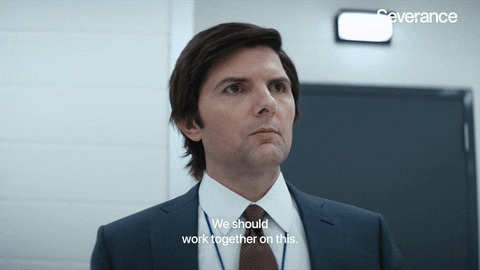What Severance Teaches Us About Work and Connection
The other day, I was chatting with a colleague about Severance. If you’ve seen it, you’ll know it’s one of those shows that stays with you long after the credits roll. For those who haven’t, the premise is dark but brilliant: employees at Lumon undergo brain surgery to split their “work self” from their “home self”. Their Innie knows nothing but fluorescent lights, data sorting, and melon parties. Their outie never remembers a single second spent in the office.
At one point, my colleague asked, “Would you do it? Would you sever?”
At first, it sounded tempting. Imagine waking up each day with no mental to-do list, or no work thoughts intruding on your evening run.
But then I thought about what that really means. Losing every small moment of connection at work. The chats and laughs over lunch. The quiet pride after tackling something hard as a team. The random rituals – like thirsty Thursdays or the inside jokes that carry on for years. That’s not just work, that’s life.
What struck me most about Severance was Mark. He chose severance to escape grief and loss. For eight hours a day, his Innie felt no pain, no sadness, and no memories from the outside world. And while that’s deeply avoidant, honestly, who could blame him?
Yet even he couldn’t fully sever. His Innie still found meaning at work. He built bonds with Dylan, Irving, and Helly. They joked together, protected each other, plotted quiet acts of rebellion. Even in Lumon’s grey, windowless world, they created connection and care.
Apple TV+ Via GIPHY
Because that’s what humans do. Even when systems try to strip away meaning, we build it back in. When cultures feel disconnected or support structures are missing, people create their own. They find their crew. They build micro-communities of trust – whether it’s a quiet “you okay?” after a tough meeting, or a laugh in the kitchen when everything feels absurd.
We see this all the time in our work at Interchange. Companies can set the clearest KPIs, streamline every process, stack all the incentives in the world. But if their people don’t feel connected to each other, their leaders, or why their work matters; performance hits a ceiling. The teams that truly thrive are the ones that build trust, create belonging, and make people feel safe to show up as themselves.
And research backs this up. Self-Determination Theory tells us people need autonomy, competence, and connection to feel motivated. However more recent studies show that psychological safety and belonging are the real game-changers here. When people feel safe to speak up, take risks, and know their contributions matter, performance doesn’t just improve, it becomes sustainable.
Think about your own team. When you feel trusted and valued in your role, you naturally give more of yourself. You go the extra mile, bring fresh ideas to the table, adapt more, and show up with genuine care. But when that trust and value is missing, you do just enough to tick the boxes, and then mentally check out, severed or not.
These extra efforts – known as Organisational Citizenship Behaviours – make a bigger difference than many realise. While they aren’t formally recognised or rewarded by the system, they’re the foundation of high-performing, collaborative, and supportive cultures.
So maybe that’s the real lesson of Severance. The purpose of work isn’t just productivity. It’s about being human together – bringing who we are outside into what we do inside, and leaving each day knowing not just what we achieved, but who we mattered to along the way.
AppleTV+ via GIPHY
Want to build a culture people don’t want to sever from? Let’s talk about how to create the kind of team connection, psychological safety, and everyday meaning that make people thrive.
Reach out to the team at Interchange.



